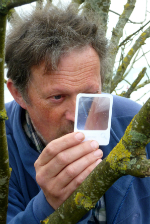OPAL (OPen Air Laboratories) is a Lottery-funded citizen science project, led by Imperial College, London, which has been running since 2007. Plymouth University has been one of the OPAL partners from the very beginning. Activities were originally limited to England, but since 2014 we‘ve been working in Wales, Scotland and Northern Ireland too.
OPAL exists to encourage people to get outside and start exploring their environment, while taking part in real scientific studies. Working locally, our participants help contribute to the national picture on a range of environmental themes. We like to engage both the heart and the head through our activities, as well as producing scientific papers and reports – see www.imperial.ac.uk/opal/publications.
So how do we achieve this? We have a series of seven surveys on the following topics:
- Bugs Count (insect diversity)
- Air Quality (lichens and air pollution)
- Biodiversity (hedgerows)
- Water Quality (pond dipping)
- Tree Health
- Soil Survey (earthworms)
- New Zealand Flatworm (invasive species)
We’re also developing a brownfield survey which looks at the surprising value of abandoned industrial land for a range of wildlife.
These are all professional quality, educational, user friendly and, even better, free (on the condition that the participants try their best to carry out the surveys as instructed). Printable versions are also available at the OPAL website www.opalexplorenature.org.

In my role as the Community Scientist for the South West, I organise and facilitate events, travel to schools, meet a wide range of groups, train teachers, give talks and frequently get my hands dirty. My patch consists of Cornwall and Devon, although I’m always open to offers from further afield.
Experience tells me that with a little bit of guidance, almost everyone can make a useful contribution to all sorts of projects which professional scientists would never get around to doing – there simply aren’t enough of us. And OPAL citizen scientists frequently tell me that they really enjoy taking part.
As well as our very worthwhile scientific objectives, we’re creating opportunities for people to engage directly with nature in a way that many of them may not have done before; through doing so, they often come to appreciate its subtlety, complexity and beauty. The health benefits of experiences in natural environments are well established and are all part of OPAL’s heady cocktail. What’s not to like?
Our citizen scientists come from all walks of life and across a very wide age range. We work with individuals, community groups, schools – anyone who wants to take part. Participants derive satisfaction from purposeful activity outdoors, learning more about their local environment and knowing they are making a contribution to a greater understanding of the natural world and how it is changing. And, let’s face it, getting down on your hands and knees and scrabbling around in leaf litter rekindles the inner wild child in most of us.
Those who show that they can carry out OPAL surveys competently can choose to be awarded with an OPAL Level One Accreditation Certificate for each of the survey types they complete. Level Two certification, which will allow accredited trainers to deliver the OPAL programme, is coming soon; watch this space.
So how are we doing so far? Here are a few basic facts about OPAL and what’s been achieved since the project’s inception:
- More than 930,000 participants
- More than 3,500 schools have taken part, many from areas of high deprivation
- Over 2,800 organisations have worked with OPAL
- Approximately 270,000survey packs have been distributed to the public
- Over 54,000 surveys submitted
- 23,000+ sites surveyed
- 21 scientific papers published
I’m not sure whether I ever have a typical day. I might spend the morning working on an article for a publication like this, followed by a pleasant afternoon pond dipping in a community nature reserve with a bunch of enthusiastic children. Other days, it rains. Not that I let that stop me….
If anyone would like to acquaint themselves with the OPAL project, peruse our resources or have a go at the surveys, please contact me on owen.smith1@plymouth.ac.uk or visit www.opalexplorenature.org
Owen Smith, OPAL Community Scientist
School of Biological Sciences, Plymouth University
